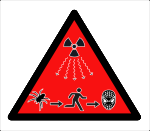When are you responsible? And when are you accountable? I feel responsible for writing these…
The Three Phases of Creativity
A little background reading on creativity made me find the article Definitions of Creativity, by Arthur J. Cropley, which provides interesting material on this topic.
Cropley writes that there are three phases of creativity:
- Preconventional creativity is the kind of creativity commonly exhibited by children younger than 6-8 years old. It is mainly formed using visual perception, and it involves spontaneity, emotional involvement, and sometimes the repainting of a child’s bedroom walls.
- Conventional creativity is the second phase of creativity. It is often found in children between 6-8 and 10-12 years old, and it involves actual thinking, but this is dominated by constraints and conventions that are imposed by the child’s skills that are being developed.
- Postconventional creativity is the third and last phase, and it is found in children older than 10-12 years, and in adults. In this phase people are able to produce new things despite knowing what the constraints and conventional approaches are. It often involves novelty, and angry responses from other people.
The important difference between preconventional and postconventional creativity is that small children produce novelty because they are ignorant of the constraints, while adults can produce novelty despite knowing the constraints. For example: my first printed publication as a 4-year old child was a marriage card I designed for my kindergarten teacher:

drawing made when I was 4 years old
My preconventional creativity made me depict my teacher about five times as big as her new husband (maybe because, in my mind, she was about five times more important). Later, in my conventional creative phase, I learned to draw humans in more reasonable shapes and sizes:
drawing made when I was 7 years old
But much later, when I was a student, my talents had entered the postconventional phase, and my drawings reverted to the same distortions I had unknowingly experimented with when I was four years old. Only this time it was intentional:
drawing made when I was 19 years old
(Yes, there is something about me and big women, or thin men. I'm sure some psychologist can explain it to me.)
I believe the three phases of creative thinking are a useful tool, but I don’t believe they have anything to do with the minds of children. Let me explain this with another example: In the old days of Windows 3.1, before the Internet and the availability of huge amounts of design information, I once showed a friend of mine some printed pages of text I had created using a cool font. I told him I had somehow lost the font and was unable to find it. My friend, who was blissfully ignorant of anything related to computers, looked strangely at the printed text, and he said he didn’t understand my problem. “But you have the font on paper here,” he said. “Yes,” I answered, “but it’s not in my computer.” At this he replied with a puzzled look: “But yesterday you showed me your new scanner. Why don’t you scan the font back into the computer?”
The three-phase approach to creativity applies to everyone, adult or not, who is not familiar with the constraints of a certain problem domain. Anyone of us can be naïve and ignorant, and all of us are able to come up with ideas that are too far-fetched to be considered by experienced people whose creative thinking takes place in the conventional phase. The idea of scanning a font from printed paper into a computer was a very original and creative solution, for someone who is too ignorant to understand that it is also a ridiculous idea. As a software developer, locked in the conventional phase, I couldn’t have imagined this even if I wanted to.
The problem with knowledge is that, at first, it constrains people’s views of the world. They lose their childlike and uninhibited talent to make ridiculous connections between unrelated things. The challenge is to regain that talent by moving to the phase of postconventional creativity, which enables a person to be as imaginative as a child, but with the knowledge of what the real constraints are. Only then can they achieve the highest levels of creativity, and make drawings that are even more bizarre than mine.
In many organizations employees get stuck in the conventional creative phase. They aren’t being challenged to get to the next level. It is a manager’s job to make sure that employees advance to the level of postconventional creativity, for the sake of innovation, and organizational survival.
(photo by benimoto)
 Twitter –
Twitter – Subscribe –
 Newsletter –
Newsletter –  Bookmarks
Bookmarks
| Latest, greatest and favoritest posts: Accountable or Responsible? Communication = Information * Relationships Creativity as the Root of Software Development |







